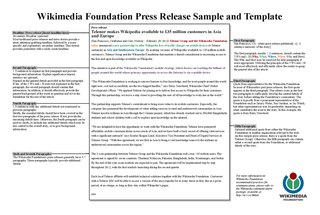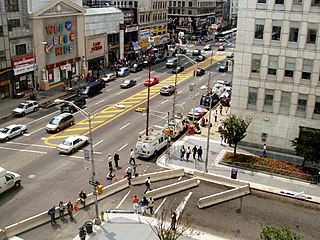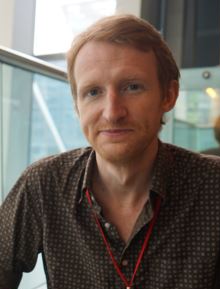Journalism is the production and distribution of reports on current or past events. The word journalism applies to the occupation, as well as citizen journalists who gather and publish information. Journalistic media include print, television, radio, Internet, and, in the past, newsreels.
A news presenter – also known as a newsreader, newscaster, anchorman or anchorwoman, news anchor or simply an anchor – is a person who presents news during a news program on the television, on the radio or on the Internet. They may also be a working journalist, assisting in the collection of news material and may, in addition, provide commentary during the program. News presenters most often work from a television studio or radio studio, but may also present the news from remote locations in the field related to a particular major news event.

Deutsche Welle or DW is a German government-funded public international broadcaster. The service is available in 30 languages. DW's satellite television service consists of channels in English, German, Spanish, and Arabic. While funded by the German government, the work of DW is regulated by the Deutsche Welle Act, meaning that content is intended to be independent of government influence. DW is a member of the European Broadcasting Union (EBU).

A press release is an official statement delivered to members of the news media for the purpose of providing information, an official statement, or making an announcement. A press release is traditionally composed of nine structural elements, including a headline, introduction, body, and other information. Press releases can be delivered to members of the media physically on paper and electronically.

The news media or news industry are forms of mass media that focus on delivering news to the general public or a target public. These include print media, broadcast news, and more recently the Internet.

Credibility comprises the objective and subjective components of the believability of a source or message. Credibility dates back to Aristotle theory of Rhetoric. Aristotle defines rhetoric as the ability to see what is possibly persuasive in every situation. He divided the means of persuasion into three categories, namely Ethos, Pathos, and Logos, which he believed have the capacity to influence the receiver of a message. According to Aristotle, the term “Ethos” deals with the character of the speaker. The intent of the speaker is to appear credible. In fact, the speaker's ethos is a rhetorical strategy employed by an orator whose purpose is to "inspire trust in his audience.” Credibility has two key components: trustworthiness and expertise, which both have objective and subjective components. Trustworthiness is based more on subjective factors, but can include objective measurements such as established reliability. Expertise can be similarly subjectively perceived, but also includes relatively objective characteristics of the source or message. Secondary components of credibility include source dynamism (charisma) and physical attractiveness.
Radio Sawa is a Middle Eastern radio station broadcasting in the Arab world. The station is a service of the Middle East Broadcasting Networks, Inc., which also operates Alhurra Television and is publicly funded by the U.S. Agency for Global Media and the U.S. Congress. The word "sawa" means "together" in many Arabic dialects.

Australia has a modern and diverse media industry spanning traditional and digital formats, and catering mostly to its predominantly English-speaking population. In 2018 the Press Freedom Index ranked Australia 19th out of 180 countries
The media of Kazakhstan refers to mass media outlets based in The Republic of Kazakhstan. Media of Kazakhstan are a set of public information transfer agencies in the Republic of Kazakhstan. The Constitution of Kazakhstan guarantees freedom of press, but privately owned and opposition media have been subject of censorship. In 2004 the International Federation of Journalists identified a "growing pattern" of intimidation of the media, and in 2012 several opposition media outlets were ordered to be shut down on charges of promoting "extremism".
Sudan has many local and national newspapers. The major national dailies are published in Arabic or English. Sudan Television broadcasts sixty hours of programming a week. The Sudan National Broadcasting Corporation airs radio programming in Arabic, English, French, and Swahili. Radio and television stations are state-controlled entities and serve as outlets for the government viewpoint. Journalists and the papers they serve, although subject to government censorship, operate with more freedom and independence than in most neighboring countries or Arab states. The Voice of Sudan, sponsored by the National Democratic Alliance, broadcasts in Arabic and English. The opposition Sudan People's Liberation Army issues its own newspapers and journals.
The media of Ukraine refers to mass media outlets based in Ukraine. Television, magazines, and newspapers are all operated by both state-owned and for-profit corporations which depend on advertising, subscription, and other sales-related revenues. The Constitution of Ukraine guarantees freedom of speech. As a country in transition, Ukraine's media system is under transformation.
Algeria has more than 45 independent Arabic language and French language publications as well as 4 government-owned newspapers, but the government controls most printing presses and advertising. The Algerian newspapers with the largest circulations are Echourouk (1,800,000), Ennahar (1,600,000), El Khabar (1,000,000) and Quotidien d'Oran (700,000); all four are employee-owned. The government also owns all radio and television outlets, which provide pro-government programming. In 2004 and 2005, the government increased the access of Berber language and culture to both print and broadcast media.

The media of Cuba consist of several different types: television, radio, newspapers, and internet. The Cuban media are tightly controlled by the Cuban government led by the Communist Party of Cuba (PCC) in the past five decades. The PCC strictly censors news, information and commentary, and restricts dissemination of foreign publications to tourist hotels. Journalists must operate within the confines of laws against anti-government propaganda and the insulting of officials, which carry penalties of up to three years in prison. Private ownership of broadcast media is prohibited, and the government owns all mainstream media outlets.
The media of Syria consists primarily of television, radio, Internet, film and print. The national language of Syria is Arabic but some publications and broadcasts are also available in English and French. While television is the most popular medium in Syria, the Internet has become a widely utilized vehicle to disseminate content. Transcending all available media, the government seeks to control what Syrians see by restricting coverage from outside sources. Publications and broadcasts are monitored by members of the government. Syria is ranked as one of the most dangerous places in the world for journalists. There were 28 journalists killed in combat in 2012.

The media of Egypt is highly influential in Egypt and in the Arab World, attributed to its large audience and its historically TV and film industry supplies to the Arab-speaking world. A period of ease on media marked the last years of Hosni Mubaraks rule, but since the 2011 revolution and 2013 coup d'état, Reporters Without Borders said "successive governments have tried to control the media and have not hesitated to impose measures restricting journalists' freedom," in 2016, and "the situation of media freedom in Egypt is extremely worrying" in 2017. and while state media is "almost always loyal to President al-Sisi." and most pro-Islamist media have been closed, or now broadcast from abroad, journalists and human rights defenders are denied access to parts of Sinai region, and are obliged to report only the official version of "terrorist" attacks under the terrorism law that was adopted in August 2015. Following the 2011 revolution, acquisitions of media outlets and private newspapers by businessmen linked to the government started surfacing, initially with close ties to the newly in-power Muslim Brotherhood, businessmen then shifted in 2013 with the deposition of former President Mohamed Morsi to Gen. Abdel Fattah al-Sisi's support and regime. In 2016 the take over by businessmen linked to the government and intelligence services escalated rapidly; and the regime's domination of the media is affecting even pro-government media. In addition to those acquisitions, the government tapped into the market with a major new TV network named "DMC" with a range of news, sports and entertainment channels changing the landscape beyond the "official" outlets that lost their credibility, DMC also imposed a de facto monopoly over filming where other privately owned TV channels are denied access. On the internet, Egypt banned at least 62 websites in a crackdown in June 2017, including Daily Sabah, Medium, Al Jazeera, The Huffington Post, and Mada Masr along with opposition websites, like El-Badil, for containing material that "support terrorism and extremism as well as publish lies", that blockade was followed by a growing list of censorship circumvention and VPN providing websites in addition to the blockade of OpenVPN protocol on a nationscale. The crackdown was condemned by the Association for Freedom of Thought and Expression (AFTE), Mada Masr and by the Index on Censorship. The ATFE stated that "the blocking of websites violates the Egyptian Constitution". The country saw a period of increasing freedom from governmental control during last years of ousted president Hosni Mubarak. Although Freedom of the media is guaranteed in the constitution, and the government was increasingly respecting this, however many laws still remain that restrict this right. Back in 2005, and after the Egyptian presidential election, Ahmed Selim, office director for Information Minister Anas al-Fiqi, declared the era of "free, transparent and independent Egyptian media".

The media of Mongolia refers to the print, broadcast and online media in Mongolia. Since the collapse of the Soviet style system in 1990, the media has undergone large reforms which have allowed greater diversity and freedom of the press which make it one of the most free in the region. Censorship of media outlets is forbidden under the 1998 Media Freedom Law. In its 2013 report, Reporters Without Borders classified the media environment as 98th out of 179, with 1st being most free.

The Jordan Media Institute (JMI) Is a non-profit educational entity in Amman, Jordan focusing on journalism.
Type Media Center is a nonprofit media organization that was previously associated with The Nation magazine. It sponsors fellows, hosts forums, publishes books and investigative reporting, and awards several annual journalism prizes. Orville Schell worked for the organization, and Katrina vanden Heuvel is currently a member of their Board of Trustees. Type Media Center fellows have included Naomi Klein, Wayne Barrett, Chris Hedges, David Moberg, Jeremy Scahill, and Chris Hayes. The organization has also funded podcasts, short-form broadcast media, and documentaries, including several by Habiba Nosheen.

Hong Kong Free Press (HKFP) is a free, non-profit news website based in Hong Kong. It was founded by independent journalists in response to concerns over declining press freedom in the territory; to provide an alternative to the dominant English-language news source, the South China Morning Post; and to provide quicker English coverage of local news.

OpIndia is an Indian right-wing news portal founded in December 2014 by Rahul Raj and Kumar Kamal. It also claims to be a fact-checking website. OpIndia has published fake news on multiple occasions. In 2019, the International Fact-Checking Network (IFCN) rejected OpIndia's application for accreditation as a fact checker.











